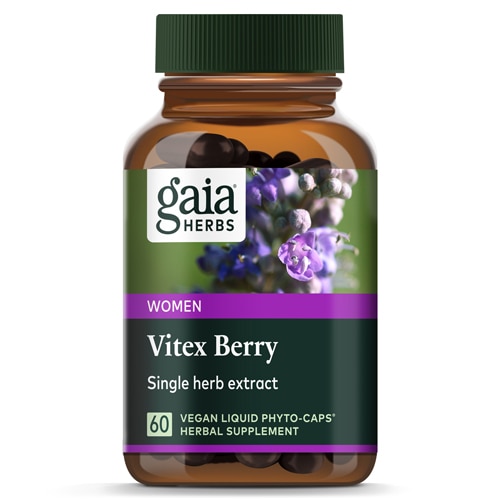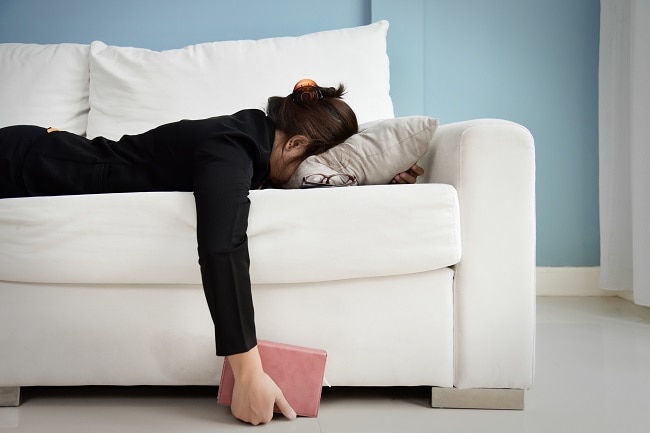We tend to think of hormones only during seismic shifts in life—puberty, say, or pregnancy and menopause. Hormones, however, are as constant as breath. They impact us on a daily, even hourly basis, influencing our outlook on life, our level of contentment, our skin’s radiance, even the rapidity or slowness of our thoughts.
When these vital chemical messengers are in sync, life is grand: Our smiles readily arrive, our minds work with ease (our relationships too, and our clothes fit as they should. But when one hormone is in excess—or there’s a dearth of another—our entire system may be thrown off-kilter. This can result in a whole laundry-list of issues, from acne (yes, even as an adult) to fluid retention to the temporary death of our libido.
Sound familiar, if not uncanny? Here are 6 signs that your hormones are out of whack—and the natural strategies you might try to get them back on track:
1. Irregular periods
For years, your period appeared every 28 days, lasted 3-5 days, and arrived with little more than some good old fashioned PMS. Now, it takes longer to make an appearance, it’s far heavier than you’ve ever experienced, and you’re spotting between periods. What gives?
Fluctuations in your period are a telltale sign that something may be amiss with your hormones. If your period is absent, lighter, heavier, longer or shorter—or accompanied by far more taxing PMS symptoms—you may be hitting perimenopause or menopause, both of which influence your estrogen and progesterone levels. Irregular periods could also be a sign that your thyroid hormone has been compromised.
Pro tip: Start tracking your period with an app. Your menstrual cycle reflects the state of your overall health and knowing—not guessing—that something is awry will help you and your physician discover its cause, whether it’s a symptom of aging or something graver.
2. Skin issues
If your skin can’t hold moisture regardless of how much lotion you apply, you may want to have your thyroid hormone checked. If your levels are insufficient, your whole system can get sluggish—including the rate at which your skin cells turn over. The result may be dry patches, rashes, and redness Meanwhile, a surplus of testosterone can amp up oil production and lead to acne, particularly on the bottom half of your face.
Pro tip: Ditch the preservatives. These endocrine-disruptors can wreak havoc on your hormones by mimicking estrogen (and, thus, “competing” with naturally-produced estrogen). As a result, you may experience any one of the symptoms listed here. Instead, eat fresh, whole, unprocessed foods. And if you do want bread, purchase it from a local bakery: Many store-bought baked goods are packed with preservatives because the oil in grains is at risk of turning rancid.
3. Insomnia and anxiety
You’re often fatigued throughout the day—so much so that getting through work is a drag—but when it comes to bedtime you can’t for the life of you fall asleep.
Progesterone may be to blame. Or, rather, insufficient levels of it. One of the telltale signs of a short supply is insomnia during the second half of your menstrual cycle, especially if you wake frequently in the middle of the night and are unable to resume sleeping. Since progesterone can activate receptors in your brain that promote mental calmness, another strong indicator of low progesterone is anxiety that happens exclusively during the second half of your cycle, thereby giving you that “wired but tired” angst. What’s more, because progesterone plays a role in your internal thermostat, it can cause your body’s mercury levels to rise and fall throughout the night, which may keep you from getting solid, healing sleep.
Pro tip: Many symptoms of deficient progesterone can be treated with lifestyle changes. Chief among them? Quitting—or curbing—alcohol. You may be tempted to nurse a glass of wine before bed with the hopes that it’ll help you rest. But alcohol can have a tremendous effect on your reproductive, endocrine, neurological, and immune systems. In addition, alcohol can impact your testosterone and estrogen levels, thereby interrupting your menstrual cycle and your overall hormone health.
4. Thinning hair
Finding clumps of hair in your drain—or coming back with a palm-full of strands after raking your hands through your hair? The psychological effects of hair loss are nothing to joke about—and the reasons for causing it may be directly linked to your hormone health. Imbalances in your estrogen and progesterone levels may cause a disruption to your hair growth (and its vitality); a thyroid abnormality may present as hair loss. Meanwhile, excessive testosterone can cause hair to actually shrink, thus manifesting in thin, wispy strands, no matter how many body-boosting products you invest in.
Tip: Boost your intake of healthy fats. Avocados, olive oil, cashews, fatty fish such as tuna—all organically encourage hormone health. What’s more, the omega-3s found in healthy fats may stimulate hair growth and enhance the appearance of your locks.
5. Brain fog
You can’t remember which street to take to reach your favorite café, your phone is nowhere to be found, and sending a brief response to your boss—something that should take you less than five minutes—suddenly requires Einstein-anian strength. While you may chalk it off to any number of things, it may be due to plunging estrogen levels. When high, your brain (and wit) is razor-sharp; when low, you may forget the simplest words. While all women experience a dip in estrogen before their periods, a hormone imbalance can exacerbate brain fog—and make it appear more frequently.
Pro tip: Prioritize movement. Exercise is one of the greatest ways to reestablish hormone balance. What’s more, consistently working up a sweat increases brain chemicals that facilitate learning and bolster focus.
6. A perpetual case of the blahs
You’re not quite blue, you’re not angry, exactly, and you’re not especially stressed, either. But the idea of doing anything outside the comfort of your home—or the comfort of your sweats—sounds about as appealing as…oh, who knows: Nothing these days seems particularly exciting; even a surprise gift from your partner engenders little more than a faint thanks.
Every woman goes through a stage in her cycle where she vastly prefers to kick it solo on the couch than kick back cocktails with her closest friends. This typically occurs during the third week of your cycle, when safety-preferring (and ultra-sedating) progesterone rises while estrogen and testosterone take a nosedive. As a result, your appetite revs up (just in case you got pregnant) while your appetite for adventure and the company of others plummets. Lower estrogen during this time can also result in reduced confidence—and, hence, less of a desire to get dressed up and go out (or even get a gym session in).
But if you have a persistent disinterest in things that used to bring you joy—early-morning coffee dates, hot yoga, your spouse’s touch—you may have insufficient DHEA. Technically known as dehydroepiandrosterone, this critical hormone, produced primarily in your adrenal glands and ovaries, can foster lean muscle mass, inspire happiness, and fill you with the get-go to enjoy life’s pleasures. Inadequate levels, meanwhile, may lead to a lower sex drive, diminished memory, and weight gain. Whether this insufficiency is due to chronic stress or lack of sleep—both can interrupt natural cortisol levels and mess with DHEA production—it may generate an ongoing case of bleh; please leave me alone.
Pro tip: Scrap the sweets. You’re likely well-aware that sugar, particularly the refined stuff, can radically impact the quality of your moods, skin, hair, energy levels—you name it. But just in case you need another reason to steer clear of the dessert table, do know that sugar consumption can also take a toll on your excitability scale. How? High sugar consumption makes insulin and blood sugar levels surge, and elevated insulin levels can decrease DHEA levels. If your mind won’t unlatch from the thought of chocolate cake, make a deal with yourself: You’ll brew a cup of anti-inflammatory tea (such as turmeric or rosemary) and take a 10-minute walk. Chances are, your sugar urge will taper during that time—and will put you that much closer to restoring hormone harmony.




